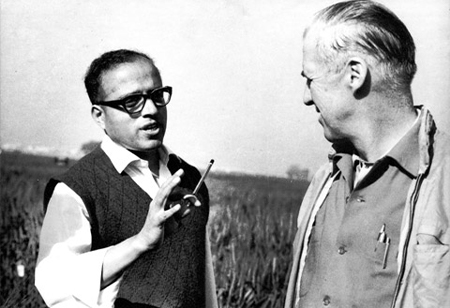
M S Swaminathan Leaves behind an Evergreen Legacy of a Safer and Hunger-Free Future


Swaminathan has left behind a legacy that India is and will continue to secure for more decades. His zeal and tireless effort without respite provides an everlasting promise of a safer and hunger free future. Swaminathan’s name stands as a synonym in sustainable technology, farmer welfare, and agricultural research since the 1960s. He is forever cemented as an eminent agricultural scientist and as one of the powerful advocators of agriculture in Asia till this day.
His demise is grieved from the President to the farmers and every stomach that needs food whether rich or poor.
Taking to social media, the President of India, Droupadi Murmu expressed, "The demise of Dr M S Swaminathan, internationally renowned agricultural scientist, saddens me no end”.
Followed by the Prime Minister who wrote, “Beyond his revolutionary contributions to agriculture, Dr. Swaminathan was a powerhouse of innovation and a nurturing mentor to many. His unwavering commitment to research and mentorship has left an indelible mark on countless scientists and innovators."
In respect of his life, that he solemnly dedicated towards the welfare of the planet, let’s take a stroll through his life changing contributions.
Birth of a Revolutionary Mind
Born in Kumbakonam, Tamil Nadu, India, on August 7, 1925, was the young green revolutionary pioneer, M.S. Swaminathan. He pursued his interest in genetics and acquired a doctorate from Cambridge University in the field. For all the opportunities abroad, he chose to move back to India with a strong will to the nation in ways he believed successful. This was a time when the Bengal famine hit in 1943.
Driven by the Impulse to Save People from Fatality of Starvation
The young Swaminathan was deeply emotionally affected by the rice crisis that took the lives of many, motivating him to take up the field of agricultural research. He pursued education at prestigious institutions like the Madras Agricultural College and the Indian Agricultural Research Institute due to personal drive.
A Future Proofing Green Revolution was Set Ablaze
After commencing work at the institute, he dreamt of developing high yield varieties of rice and wheat, the staple food of the sub-continent’s population. It was then the foundation stone of India’s resilience in food production was laid forth, launching the Green Revolution along with Dr Norman Borlaug, the Nobel Laureate and with the political patronage extended by C Subramaniam, the then food and Agricultural Minister of India. India went from having a food shortage to having a food surplus within a decade.
After resolving the food scarcity issue, Professor Swaminathan focused on other issues on which the political leadership of the time lacked knowledge or showed little to no interest.
Took Every Matter in Hand
Improvised Irrigation Techniques: Recognizing the value of water resources, he promoted and improvised irrigation techniques to make sure that crops received enough water.
Fixed Soil Fertility: The promotion of wise fertilizer use by Swaminathan resulted in greater soil fertility and higher crop yields.
He brought the poor mortality rate of women and children—caused by a lack of nutrient-rich food—to the attention of decision-makers.
Wheat cultivars with less lodging—the bending of stems under the weight of grain—and higher crop yields were developed under Swaminathan's direction.
His work with Nobel Prize winner Norman Borlaug led to the introduction of dwarfing genes into wheat types, starting the Wheat Revolution as it is now known.
Swaminathan was both a realist and a visionary. He was aware of the difficulties brought on by the Green Revolution, such as the eradication of regional crop types, problems with conserving soil fertility, and the indiscriminate use of pesticides. He also expressed worry on the overuse of groundwater resources.
Ensured Financial Security for Farmers
The establishment of a Minimum Support Price (MSP) for agricultural products, which would ensure farmers receive fair and just remuneration for their labor and investment, was one of Swaminathan's top proposals. The MSP should be established at a minimum of 50 percent over the actual cost of production, he highlighted in his suggestion. This campaign attempted to give farmers financial security by making sure they were adequately compensated for their agricultural work.
Farmers all around the country were moved by Swaminathan's relentless campaign for this just pricing system. His attention to addressing the economic difficulties the agricultural sector was facing demonstrated his commitment to enhancing the lives of farmers, who are the foundation of India's agrarian economy.
Spreading the Effect Internationally
The influence of Swaminathan went far beyond the boundaries of India. He showed his dedication to international agricultural and environmental issues in his capacity as the Director General of the International Rice Research Institute and later as the President of the International Union for the Conservation of Nature and Natural Resources. By putting him on their prestigious "Time 20" list of the most influential Asians of the 20th century, Time magazine acknowledged his undeniable effect.
Vision for Sustainable Development
Swaminathan was a fervent supporter of environmentally friendly agriculture methods and sustainable development. He envisioned a "evergreen revolution," with a focus on resource management and biodiversity preservation. His innovative thinking continues to motivate current initiatives to safeguard our planet and assure a successful future.
The M. S. Swaminathan Research Foundation was established by Swaminathan to carry on his admirable work and make a lasting impression. Through this organization, he kept up his unrelenting quest to end hunger and poverty.
His life's work will continue to serve as a source of inspiration for future generations, encouraging us all to pursue development, sustainability, and compassion in all that we do. As we remember the inspirational Father of India's Green Revolution, let's continue his legacy and cooperate to forge a more promising and sustainable future for everyone.